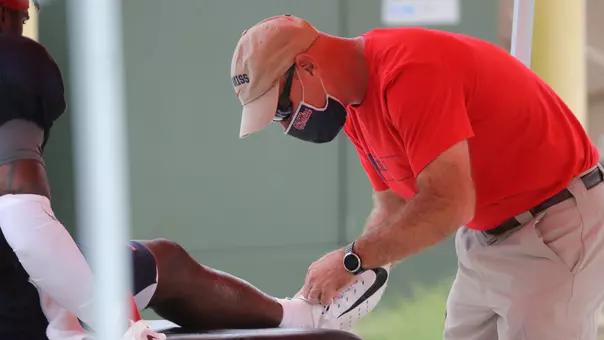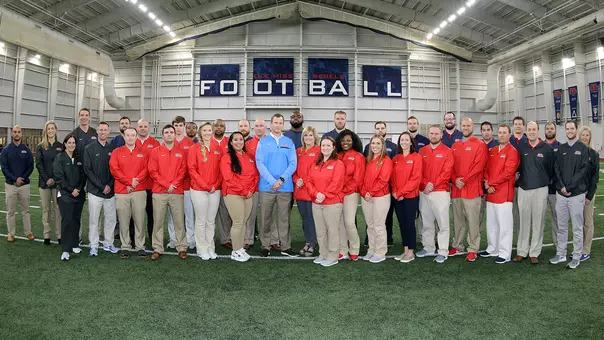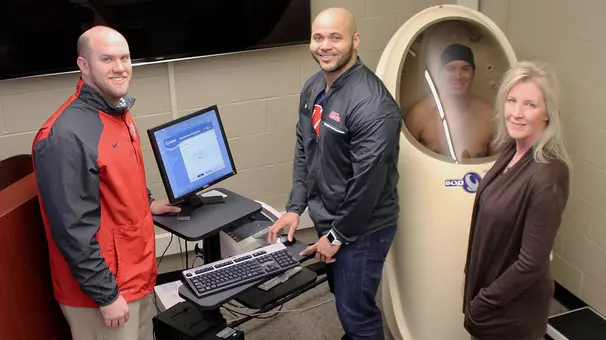The University of Mississippi Athletics

Senior Associate A.D. Singletary Completes Boston Marathon
7/15/2019 | Health & Sports Performance
OXFORD, Miss. – Life's a marathon, not a sprint.
That motto, a little help from a friend and guidance from the University of Mississippi Center for Health and Sports Performance gave Ole Miss athletics administrator Shannon Singletary the tools he needed to complete the Boston Marathon this spring.
Singletary serves as co-director of the Center for Health and Sports Performance, along with his duties in the Department of Intercollegiate Athletics, where he is senior associate athletics director for health and sports performance. He is also the sport administrator for Ole Miss track and field.
While he has run four marathons in his lifetime, Singletary has not always considered himself a runner.
"I've always been into weightlifting and some endurance, but I was never into marathon training," he said. "Long story short, I ran the Double Decker 10K here, and a buddy of mine, Bret Beauchamp, who has ran the Boston Marathon 12 years in a row, looked at my times and said to me, 'You give me two years and I'll have you qualified for the Boston Marathon.'
"And I told him, 'I'll give you two years, but there is no way you'll get me there.'"
To Singletary's surprise, he not only accomplished this, but he found himself enjoying it.
"It's a whole different concept than what I was used to," he explained. "Brett laid it out for me. I knew what goals I had, what times I had to get. I knew what the workouts consisted of, and I just kind of fell in love with it."
Singletary's marathon training consisted of lots of running, but he emphasized the importance of focusing on completing three intense workouts a week.
"The first workout is going to be a track workout where you do a lot of interval training," he said. "You run sprints – 400s, 800s or 1,600s. You try to keep a fast pace that doesn't get you so tired that you can't continue the workout but certainly still pushes you.
Singletary explained that the goal is to increase anaerobic threshold to delay extreme fatigue and avoid building up lactic acid in the muscles that causes the body to to shut down from exhaustion.
"The next hard workout of the week is a tempo run, where you are trying to run a consistent pace for 8, 10 or 12 miles. Then on the weekend, you are going to do a long run – maybe 15 miles, 20 miles or 22 miles.
"The other days, you're just doing nice and slow recovery runs just to try to recover and build up mileage."
For those interested in running a marathon, Singletary recommends going into training with a purpose and a clear mindset.
"Don't look at it like you have to go out and run a bunch of miles," he said. "Every time you go out to run, you want to run with a purpose and it needs to be a workout.
"So, have a speed day where you are doing short, faster workouts, a tempo day where it can be 3, 4, 5 or whatever miles, and then you have a longer day, but that longer day can be as slow as you want it to be until you build yourself up."
Before runners even start working on marathon training, they need to be able to run 5-6 miles three or four days a week for at least a month, Singletary said. A certain level of training is required to prepare, but it is equally important not to overtrain, he said. Overtraining can lead to stress fractures and other overuse injuries.
"If you are overtraining, you are going to have symptoms like you are very tired but don't sleep well," Singletary said. "Your appetite may or may not change; you have general body ache; and if your resting heart rate is 10 or 15 beats per minute more than it usually is, it's probably because your body is not recovering between workouts."
Rest days are equally as important as training days, he said.
"Sometimes, less training is actually more beneficial," Singletary said. "You have to have at least one full day of recovering or relaxing. You can't continually break the body down without proper recovery.
Singletary credits trainers at the Center of Health and Sports Performance with helping him throughout his preparation. Besides trainers, the center includes dieticians and strength coaches.
"I went to them for advice on how many calories I should be eating, what I should be eating and what time of the day I should be eating," he said. "All the way up until the day before the race, they laid out exactly what I should be eating."




